If you’re a student considering a credit card for the first time, you might have a lot of questions. Why is a credit card for students important? How can you use a credit card to build your credit history? What are the requirements for student credit cards? What are good credit cards for college students?
A good student credit card can help you build a credit history that will help you when you graduate. Things like getting safe and affordable housing, signing up for utilities, or getting an auto loan or personal loan all require a credit check. Even some employers will check your credit history, especially if you’ll be working in the financial sector.
Here, you’ll find information on how a student credit card, like the Discover it® Student Cash Back or Discover it® Student Chrome, can help you build a brighter financial future. You’ll also learn about credit cards and building a good credit history.










